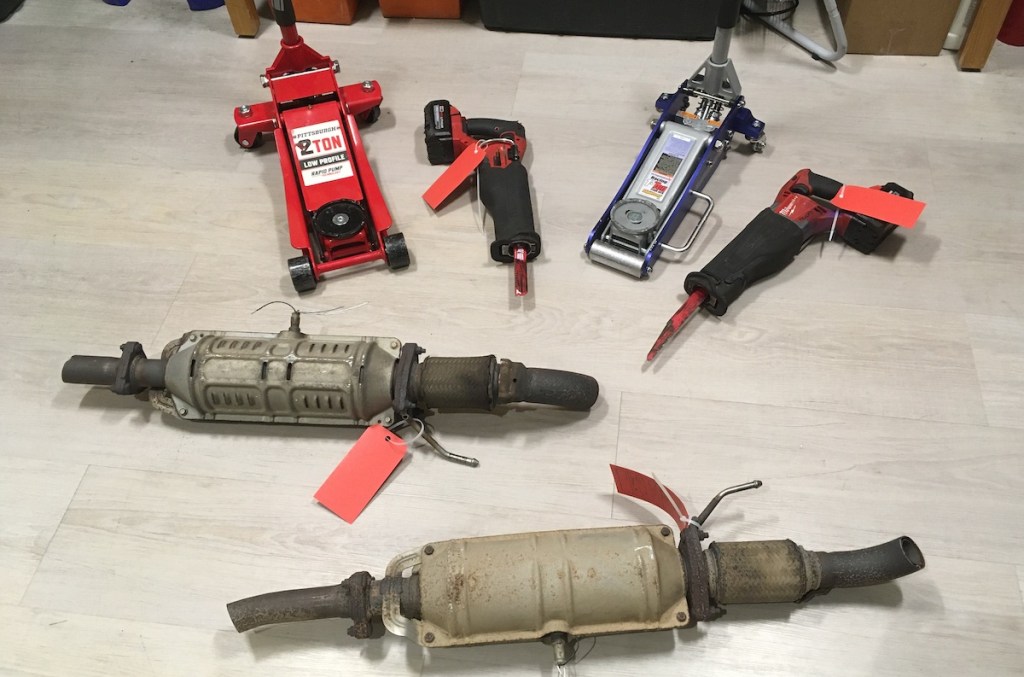Late last week, Santa Barbara County Sheriff’s Office deputies arrested a trio of alleged thieves caught after reportedly sawing off a catalytic converter from the underbelly of a car parked on Palmetto Drive in Carpinteria at around 2:30 a.m. The suspects — all in their mid-thirties and hailing from Los Angeles — were arrested and held on $1 million bail.
The next night, the Sheriff’s substation in Carpinteria got reports of three more such thefts.
“It’s fast and easy money,” explained Lt. Butch Arnoldi. “It’s spiking everywhere in the entire state of California.”
Catalytic converters, he said, can be stolen in about five minutes by any thief equipped with a portable electric saw. In the Carpinteria case, Arnoldi noted that the alleged thieves also used portable car jacks, suggesting they might have had some girth issues to contend with as well.
Arnoldi said some recycling operations in Los Angeles will pay anywhere from $50 to $250 for catalytic converters. “It’s the precious metals,” he explained: platinum, palladium, and rhodium. Palladium, Arnoldi stated, fetches $2,800 an ounce. Rhodium goes for $19,500. “It’s crazy.”
Catalytic converters have been required on all cars by the federal government since 1975; they burn toxic emissions produced by the internal combustion process before those more harmful gases can make their way out the tailpipe. Without such converters, cars can still run, but only at ear-shattering volumes.
“It sounds like a modified exhaust with a glass muffler,” Arnoldi said. “They sound like a really loud motorcycle.”
To replace a stolen converter, he said, costs $2,000-$4,000. But for the recyclers who buy them from the front-line thieves and sell them to the processors, it’s $1,000 a pop. “Easy money,” Arnoldi said again.
Sign up for Indy Today to receive fresh news from Independent.com, in your inbox, every morning.
To avoid theft, the Sheriff’s Office recommends parking in well-lit places or in a locked garage. Ventura County offers residents decals bearing the Sheriff Office’s logo to discourage theft. Arnoldi said license plate numbers can be stenciled on the converters in case of theft. Some owners weld protective metal cages over theirs.
In the Carpinteria case, the victim had just gotten home from work when she heard a van pull up in front of her home. Then she heard the sound of the saw. She went outside and confronted the crew. “I definitely don’t recommend that,” Arnoldi said. “Call us instead. But call us at the time; don’t wait until the next morning.”
Catalytic converters have long been targeted by thieves, but they’ve gotten more attractive since COVID. “A lot of people lost their jobs,” he said. “It’s easy work and fast money.”
The catalytic converter has emerged as the propelling force in No Sudden Moves, the gritty Detroit noir film set in the 1950s that was just released on HBO Max. Starring Don Cheadle and Benicio del Toro, it’s heavy on the atmospherics and has enough plot twists to induce terminal whiplash. Driving it all is a conspiracy by the Big Three auto manufacturers to deny the impacts of air pollution and to resist efforts to mandate the installation of catalytic converters on cars.
In real life, the Justice Department would, in fact, take the Big Three to court, alleging environmental foot-dragging from the 1950s to the early 1970s even though the basic technology existed as long ago as 1930.
In fire-prone communities like Santa Barbara, the catalytic converter’s blessing is seen as mixed. Converters can get as hot as 1,400 degrees; they’re where toxic gases are cooked into oblivion. But upon direct contact with dry brush, they can function as the equivalent of a blow torch. And if not functioning well, defective converters can blow molten chunks of material out their exhaust pipes. Either way, they are known to start fires. “That’s why you see Caltrans mowing the grass along the side of the freeway, cutting it down to four inches instead of 12 inches,” said Arnoldi.
Support the Santa Barbara Independent through a long-term or a single contribution.

